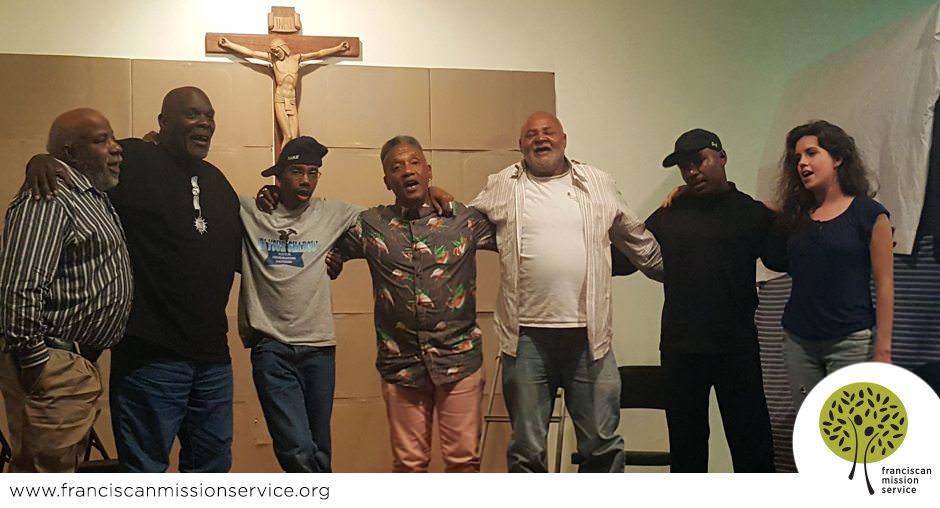“The Lost Boys” Play

Editor’s note: DC Service Corps member Ali Sentmanat reflects on her experience of creating and performing a play with some of the men at the Father McKenna Center.
I have been serving at the Father McKenna Center for nine months now, working with the men who come to the Center and who are determined to turn their lives around and move out of homelessness. My responsibilities include running the clothing program, the computer lab, and our mailing system, but—after the first week of working at the Father McKenna Center—I knew that I wanted to do a play with the guys. I was a drama major at the University of Dallas. For me, theater is the ability to communicate what cannot otherwise be communicated, and I felt that the men who come through here all have a story to tell. I talked to the Case manager, and in February we were finally able to start putting something together.
At first, the project began with the idea of writing a play and having the men at the Center act it out. I wrote up a draft of the script and, in March, I started rehearsals with 5 guys who had shown interest and volunteered their time. As a way to get to know one another, we started sharing stories of our pasts and our future hopes. One man started talking about the death of his wife, which led the other guys into talking about their experiences with love, lost love, and heartbreak. Another talked about the experience of seeing his daughter for the first time and realizing that she had to be his daughter because she looked exactly like him.
I was so moved after that initial discussion, and I realized that the guy’s own personal stories were more interesting then any play that I could write for them. So I began to compile their stories into sections. Many of the guys had zero experience in theater, but they did have experience singing, so I decided to incorporate song into the performance.
Once the script was finished, we rehearsed at least twice a week for two months. Some days, everyone showed up on time, and we would begin practicing the songs and going over the script. Other days, someone would forget to show up, and we would worry that we might not be ready in time. One day, there was a tornado that came through and ripped off the building roof, right in the middle of us singing “Silent Night” (a song I incorporated because it was the absolute favorite of one of my actors). We were all okay.
Finally, on April 27th, the Father McKenna Center was celebrating its Volunteer Appreciation Night. There was Mass, a dinner, and then the evening would conclude with a performance of our long-awaited play. After every speech and every song, people reacted with laughter or clapping. I could see the guys’ eyes fill with confidence as the play went on. One of the guys played a man who was very compromised, coming on the stage to throw cans around or beg. At one point, he too begins to tell his own story of coming to the McKenna Center and he realizes that he still has another chance in life. Tears streamed down his face as he told his story, and it was in that moment that I didn’t care about how many little things went wrong, or who had showed up to rehearsal, because I knew that for that one tear, the performance was completely worth it.
After the show, the volunteers gave the men a standing ovation, and everyone was beaming.
People not only enjoy telling their stories, but I believe it is necessary for people to share their stories for the continuation of the human race. We survive through story. We all have experienced some suffering or pain, but it is by story that we can begin to truly feel and heal for the future.
Reflection Question: We all have our stories to tell. How can you share a little of yours today and be present for another person’s story?
Tagged in:
